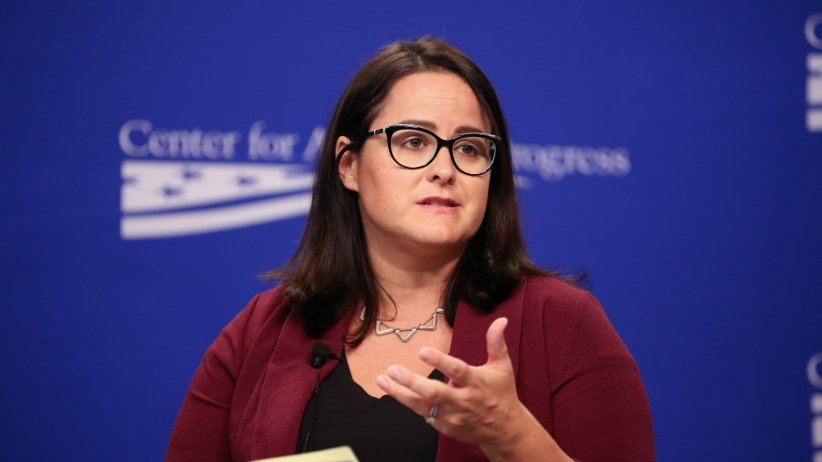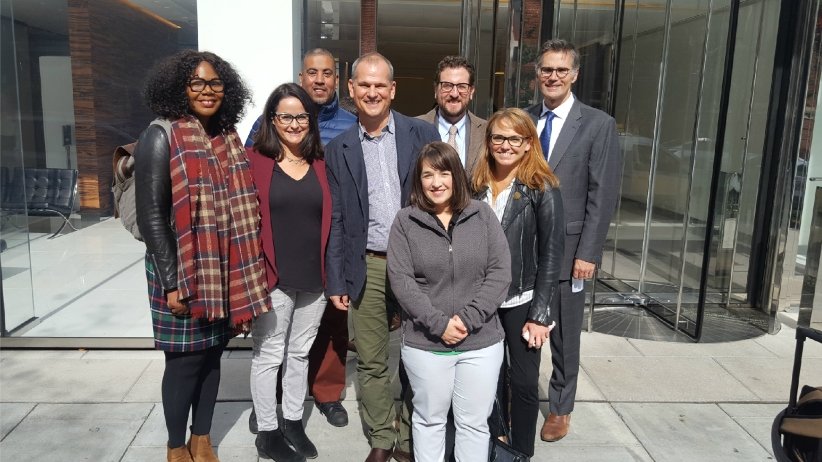Coalition Launches Campaign to Combat Hateful Activity Online

Jessica J. González of Free Press with allies from the Southern Poverty Law Center, Color Of Change and the Center for American Progress
Timothy Karr
White supremacists organized the march in Charlottesville in 2017 via Facebook, PayPal and Discord.
The murder of Heather Heyer and the vicious beating of Black resident DeAndre Harris during the ensuing riots showed the tragic consequences of online hate.
Today Change the Terms — a coalition of more than 40 groups led by Free Press, Color Of Change, the Center for American Progress, Lawyers’ Committee for Civil Rights Under Law, the National Hispanic Media Coalition and the Southern Poverty Law Center — launched a campaign to push tech companies to disrupt hate and extremism online.
For the past year, our organizations have met with experts on human rights, technology and terrorism around the world to gather insights into how hate groups organize and how tech companies can combat this activity. We developed a comprehensive set of recommended corporate policies and terms of service that companies can use to reduce hateful behavior while protecting free speech and Net Neutrality.
Neera Tanden of the Center for American Progress delivered the opening remarks during today’s Change the Terms launch event. Her colleague Henry Fernandez moderated the discussion, which featured panelists Heidi Beirich of the Southern Poverty Law Center, Brandi Collins-Dexter of Color Of Change and Jessica J. González of Free Press.
“These policies balance our desire to disrupt organized white-supremacist violence online with our values for free expression and privacy,” said González. “We define hateful activities as those that incite or engage in violence, intimidation, threats or defamation targeting an individual or group based on their actual or perceived race, color, religion, national origin, ethnicity, immigration status, gender, gender identity, sexual orientation or disability.”
The recommended policies cover seven categories: terms of service and acceptable-use policies; enforcement; rights of appeal; transparency; evaluation and training; governance and authority; and state actors, bots and troll campaigns.
And as González noted, they don’t apply to internet service providers like AT&T and Comcast. That is, they have nothing to do with access to the web. Instead, they’re aimed at social-media platforms, web-hosting services, online advertisers, financial-transaction sites, video-sharing platforms, event platforms, message boards and other tech companies.
“We’re committed to preserving Net Neutrality and the openness of the web,” she said.
Beirich, who heads the Intelligence Project at the Southern Poverty Law Center, noted that white supremacists were early adopters of the web, with the hate site Stormfront launching in 1995.
“In the pre-World Wide Web era, it was actually pretty hard for white supremacists to get propaganda out, contact other people and organize events,” she said. “The rise of social media enabled them to disseminate propaganda very quickly and radicalize individuals. And this has had real-world consequences. Dylann Roof probably wouldn’t have killed those people in South Carolina if he had not gone down a rabbit hole of hate sites in terms of the way Google’s algorithms functioned at the time.”
While the open internet has enabled people of color to share their stories and fight for justice online, it’s also made them vulnerable to harassment, threats and violence.
“In late 2014, early 2015, there were these closed Facebook groups, particularly in California and Georgia, that were sharing the personal information of people involved in the Movement for Black Lives, including physical location,” said Collins. “People were showing up at activists’ homes and places of work with guns.”
Collins said that Color Of Change and the Center for Media Justice met with Facebook at the time to discuss the issue and were told “we’re looking into this, it’s not that bad, we got this.”
“These platforms were not built with marginalized communities in mind,” she said. “Hateful activity is given a pass and groups speaking out are censored.”
González echoed Collins. “Those of us who are targeted often choose not to speak out because we’re scared of retaliation.”
That’s why it’s so crucial, González noted, for tech companies to invest time, money and resources into human content moderators who are well trained and who represent impacted communities. “Computers don’t understand context,” she said. “We need to have people doing this work.”
Collins noted that leaked Facebook documents showed that as of 2017, the company protected white men from hate speech — but not Black children.
“Often those who are most in need of free speech are those with the least access to it and the [worst] consequences,” she said. “Marginalized groups have been silenced under current policies at an alarming rate.”
This is why it’s essential for companies to adopt the recommended policy on rights of appeal, which states that a platform must provide notice and a fair right of appeal to someone if their content is taken down.
Following the discussion, the panelists took questions from the audience exploring everything from online misogyny to fake news to problematic search algorithms.
The Change the Terms coalition will track the progress of major tech companies — especially social-media platforms — in adopting and implementing these model corporate policies. And in May 2019, the coalition will release an in-depth report card evaluating how the companies are doing.
At the end of the day, Beirich said, an individual shouldn’t have to bear the burden of flagging hateful activity. “This can’t be done in a piecemeal way,” she said. “The burden should fall on the corporations.”
Check out the video of today’s discussion and urge tech companies to adopt and implement these model policies.
And check out some event photos below:



